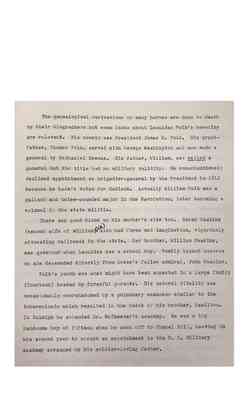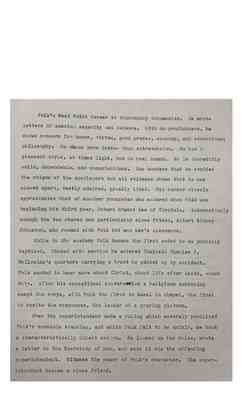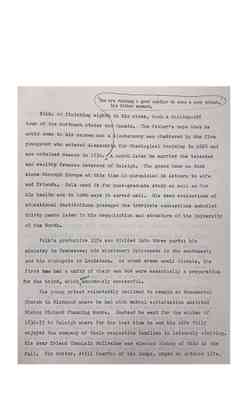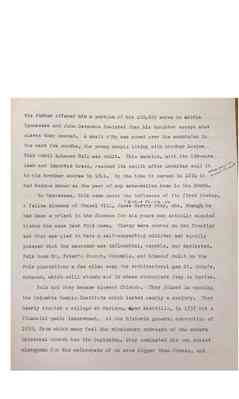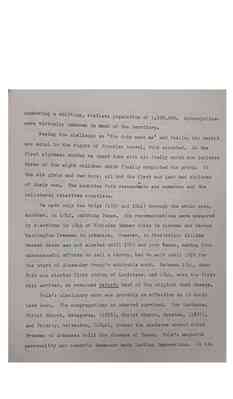Pages
6
The genealogical derivations of many heroes are done to death by their biographers but some facts about Leonidas Polk's heredity are relevant. His cousin was President James K. Polk. His grandfather, Thomas Polk, served with George Washington and was made a general by Nathaniel Greene. His father, William, was called a general but the title had no military validity. He conscientiously declined appointment as brigadier-general by the President in 1812 because he hadn't voted for Madison. Actually William Polk was a gallandt and twice-wounded major in the Revolution, later becoming a colonel in the state militia.
There was good blood on his mother's side too. Sarah Hawkins (second wife of William Polk) also had force and imagination, vigorously advocating railroads in the state. Her brother, William Hawkins, was governor when Leonidas was a school boy. Family legend assures us she descended directly from Drake's fellow admiral, John Hawkins.
Polk's youth was what might have been expected in a large family (fourteen) headed by forceful parents. His natural vitality was occasionally overshadowed by a pulmonary weakness similar to the tuberculosis which resulted in the death of his brother, Hamilton. In Raleigh he attended Dr. McPheeter's academy. He as a big handsome boy of fifteen when he went off to Chapel Hill, leaving in his second year to accept an appointment to the U. S. Military Academy arranged by his soldier-loving father.
7
Polk's West Point career is thoroughly documented. He wrote letters of amazing sagacity and balance. With no prudishness, he shows concern for honor, virtue, good grades, economy, and educational philosophy. He shows more intro- than extraversion. He has a pleasant style, at times light, but no real humor. He is incredibly solid, dependable, and conscientious. One wonders that he avoided the stigma of the spoilsport but all evidence shows that he was placed apart, vastly admired, greatly liked. His career closely approximates that of another youngster who entered when Polk was beginning his third year, Robert Edward Lee of Virginia. Interestingly enough the two shared one particularly close friend, Albert Sidney Johnston, who roomed with Polk but was Lee's classmate.
While in the academy Polk became the first cadet to be publicly baptized. Choked with emotion he entered Chaplain Charles P. McIlvane's quarters carrying a tract he picked up by accident. Polk wanted to hear more about Christ, about life after death, about duty. After his sensational conversion a religious awakening swept the corps, with Polk the first to kneel in chapel, the first to recite the responses, the leader of a praying platoon.
When the superintendent made a ruling which severely penalized Polk's academic standing, and which Polk felt to be unfair, he took a characteristically direct action. He looked up the rules, wrote a letter to the Secretary of War, and sent it via the offending superintendent. WItness the power of Polk's character. The superintendent became a close friend.
8
Polk, on finishing eighth in his class, too a cooling - off tour of the northern states and Canada. The father's hope that he would come to his senses and a lieutenancy was shattered by the firm youngster who entered Alexandria for theological training in 1828 and was ordained deacon in 1830. "You are ruining a good soldier to make a poor priest" his father said. A month later he married the talented and wealthy Frances Devereux of Raleigh. The grand tour he took alone through Europe at this time is chronicled in letters to wife and friends. Polk used it for post-graduate study as well as for his health and in both ways it served well. His keen evaluations of educational institutions presaged the intricate conceptions embodied thirty years later in his organization and structure of the University of the South.
Polk's productive life was divided into three parts; his ministry in Tennessee; his missionary Episcopate in the southwest; and his bishopric in Louisiana. As sound drama would dictate, the first two had a unity of their own but were essentially a preparation for the third, which was enormously successful.
The young priest reluctantly declined to remain at Monumental Church in Richmond where he had with mutual satisfaction assisted Bishop Richard Channing Moore. Instead he went for the winter of 1832-33 to Raleigh where for the last time he and his wife fully enjoyed the company of their respective families in leisurely visiting. His dear friend Chaplain McIlvaine was elected Bishop of Ohio in the fall, His doctor, still fearful of his lungs, urged an outdoor life.
9
His father offered him a portion of his 100,000 acres in middle Tennessee and John Devereux insisted that his daughter accept what slaves they needed. A small city was moved over the mountains in the next few months, the young couple living with brother Lucius Polk until Ashwood Hall was built. This mansion, with its 100-acre lawn and imported trees, reached its zenith after Leonidas sold it to his brother Andrew in 1841. By the time it burned in 1874 it had become known as the peer of any ante-bellum home in the South. {side note: McMinnville Land Grant}
In Tennessee, Polk came under the influence of its first bishop, a fellow alumnus of Chapel Hill, James Hervey Otey, [Bedford County, VA] who, though he had been a priest in the diocese for six years was actually elected bishop the same year Polk came. Clergy were scarce on the frontier and Otey was glad to have a self-supporting minister and equally pleased that the newcomer was influential, capable, and dedicated. Polk took St. Peter's Church, Columbia, and himself built on the Polk plantation a few miles away the architectural gem St. John's, Ashwood, which still stands and in whose churchyard Otey is buried.
Polk and Otey became closest friends. They joined in opening the Columbia Female Institute which lasted nearly a century. They nearly started a college at Madison, near Nashville, in 1837 but a financial panic intervened. At the historic general convention of 1838, from which many feel the missionary outreach of the modern Episcopal church had its beginning, Otey nominated his own ablest clergyman for the episcopate of an area bigger than France, and
10
numbering a shiftin, restless population of 1,500,000. Episcopalians were virtually unknown in much of the territory.
Seeing the challenge as "the duty next me" and feeling his health now equal to rigors of frontier travel, Polk accepted. In the first eighteen months he spent with his family which now included three of the eight children which finally completed the group. Of the six girls and two boys, all but the first and last had children of their own. The Leonidas Polk descendents are numerous and the collateral relatives countless.
He made only two trips (1839 and 1844) through the whole area, another, in 1842, omitting Texas. His recommendations were answered by election s in 1844 of Nicholas Hamner Cobbs in Alabama and George Washington Freeman in Arkansas. However, in Mississippi William Mercer Green was not elected until 1850 and poor Texas, making four unsuccessful efforts to call a bishop, had to wait until 1859 for the start of Alexander Gregg's admirable work. Between 1841, when Polk was elected first bishop of Louisiana, and 1844, when the first help arrived, he remained defacto {sic} head of the original vast charge.
Polk's missionary work was probably as effective as it could have been. The congregations he started survived. For instance, Christ Church, Matagorda, (1838), Christ Church, Houston, (1839), and Trinity, Galveston (1840), formed the nucleus around which Freeman of Arkansas built the diocese of Texas. Polk's magnetic personality and powerful demeanor made lasting impressions. In his
